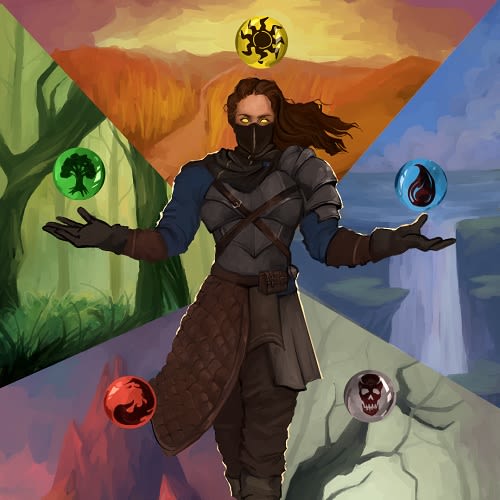Magic: The Gathering's active player base is a bit hard to estimate, as is the readership for Magic Story, because Wizards of the Coast simply doesn't share . . . well, much of anything, really. We just get the interpretations of the data as conveyed by folks like Mark Rosewater. Nevertheless, it seems pretty safe to say, based on what we've heard, that the player base of Magic: The Gathering is somewhere in the tens of millions worldwide, with the purchasing public potentially being higher.
So, it makes sense that WotC would look to superhero comics, which have a reader base 100 to 1000 times higher than Magic's player base, as a model for --
Oh, wait, I'm being informed that actually Magic has a player base 100 to 1000 times higher than the reader base of superhero comics.
Whoops.
And yet:
This is from Nic Kelman, the newly appointed "Principal Designer for Franchise Entertainment" for Magic, via Jay's interview with him last week. The interview added considerable fuel to the conflagration in the fandom over Dominaria's storyline and remarkable discontinuities between it and the previous two story arcs. To refresh everyone's memory, the most striking disjunctions are:
- Nothing much about the end of Amonkhet fits with the beginning of Dominaria. The state of the Gatewatch at the end of their fight with Nicol Bolas is rather different from how they arrive on Dominaria. Most notably, everyone develops sudden memory loss with respect to Liliana openly pledging her service to Bolas right in front of all of them.
It seems as though somewhere along the way someone decided that Liliana should have a heel-turn, but somehow she ended up doing her heel-turn . . . twice. This could, I suspect, have been smoothed over if the opening scene of Dominaria had spent more time finessing the character interactions, but this scene, like nearly everything else in this story, rushes forward in a utilitarian way, leaving Liliana's loyalty pledge forgotten.
- Jace was on Ixalan for months, and he came back with a remarkably different disposition on life. This doesn't mesh well with the apparently rapid timeline of Dominaria's events, and, more importantly, his arrival on the Weatherlight is radically different from its Ixalan version.
Some folks have defended this through Watsonian character analysis of Jace and Liliana's dynamic. This is silly. Regardless of whether Jace and Liliana's interactions are "reasonable," the overlapping portions of the stories BEFORE Liliana arrives have strikingly different tones and character interactions between Jace and Gideon. Unless you're going to explain this in-world by asserting that Jace and Liliana's perspectives on the same event are so radically different that one or both of them must be considered insane, there's just no way you can fan-analyze the disconnect away!
Taking stories published a mere year ago and simply discarding inconvenient established plot points is . . . one way to do "franchise development", to be sure. It's certainly how superhero comics do franchise development! I won't disagree that this has been for years the going strategy for capes. I assume this is why, given the lack of other useful examples of shared world fiction with as wide a reach and as long a duration as capes, everyone seems to default to referencing things like Spider-man (or, as Mark Rosewater is fond of doing, Star Wars) to prove these kinds of franchise development strategies are on the up and up.
Now, this is personally frustrating for me as someone who loves comics but can take or mostly leave superheroes. I gravitate toward stories that privilege worldbuilding and continuity. This fixation, and my frustration with superhero comics style franchise development, is assuredly based partly on my personal aesthetic, affective, and political preferences. I like what I like, and I'm going to advocate for it unapologetically. I think hiding behind sales figures and hypotheticals about mass popularity is a cheap way of avoiding arguing for your own aesthetic desires.
That said, let's talk about the actual sales figures of the superhero comics.
I think this is a fair thing to do, because whether I like the terms of this debate or not, a whole lot of people have decided that the best way to discuss popular culture is in terms of sales. Implicit and often explicit in these franchise development debates is the idea that whatever someone's referencing as a model should be considered a model of financial success. Kelman taps Marvel and Star Wars in particular as "expanding into other media . . . so successfully" and it's clear that part of that success is economic.
Superhero comics are a pretty awful model for that, though. I mean, ok, looking at recent sales numbers from Diamond there are some solid top sellers. Action Comics 1000 apparently sold about 450,000 copies. Remember, again, that Magic's active player base is somewhere in the tens of millions . . . but ok 450,000 is still, technically, also a large number.
Of course, by the time you get to the end of the top ten you've dropped down into the 75,000 copies range, and it's only a few more before you're below 50,000. I wonder how many readers Magic Story was already getting during Amonkhet and Ixalan?
By the time you reach below the top 100 you're reaching numbers that I've matched, on rare occasions, with random blog posts. That's rather inspiring for me! I'm not sure why it would inspire great confidence at Hasbro that handling Magic fiction like comic books is the way to go, though.
Maybe people are simply transposing comics right now for comics in, say, 1993, when the top 100 comics were on the whole doing better than the top TEN comics now. I'm not going to delve into all the stupid things comics have done in the intervening quarter century -- I'm a comics structuralist, not a historian, and other folks have written more interesting takes -- but we can probably look to some recent history for an illustrative example. Hey, remember when Marvel decided that Captain America should be a nazi now? And made loud noises about how this would be a significant canon-changing event that was not done through anything like mind control and wouldn't be reversed in a year? Then just sort of reversed that in a year exactly how they said they wouldn't?
Yeah, that was all dumb as hell, not to mention deeply politically questionable.
This strategy of lying to fans and treating continuity as every individual writer's grab bag of multiple choice options seems to be fairly standard in the world of comics, though. It's possible, I grant, that comics would be crashing into utter irrelevance with or without this strategy, but that leaves us arguing that the absolute best case scenario for comics franchise development is, uh, well at least it isn't making things worse.
But what of Kelman's salient point, that there's many versions of Spider-man's origin story?
Well, there aren't, really, are there? There aren't many versions that people actually care about in the very strict sense of caring enough to give Marvel their money. There are the comics versions, which a relatively small quantity of people care about . . . there's the previous movie versions, like the ones from Sony, which did ok though I seem to recall a lot of people complaining specifically about getting the same origin story a second time . . . and there's the Marvel Cinematic Universe version which is what millions of people actually care about, and which will presumably be relatively consistent in its continuity in this shared universe.
I just don't think that people actually like or want for there to be multiple versions of Spiderman's origin story. I think the actual rate at which people consume the hopelessly garbled world of superhero comics vs the streamlined and at least relatively more consistent world of the MCU suggests that people actually would like for there to be one continuity that is, in fact, largely continuous.
I could be wrong about this, mind. People have managed to convince themselves, despite all textual evidence to the contrary, that the MCU's Tony Stark has an arc, rather than merely a constant recapitulation of the same basic struggle with his own disastrous personal flaws. Perhaps audiences can also accept many different Spider-mans with many wildly tonally different origins all occupying the same continuity, the way a Jace that "grins with elation" and says: "Gideon, I'm not dead!" apparently occupies the same continuity as a Jace that "glances around, his expression serious," and says: "This ship leaves a trace very like a Planeswalker's aether trail. Your aether trails in Dominaria were close enough to crossing it that I suspected you might have met up with it. I had to do some calculations to adjust for altitude and speed. It was tricky but manageable."
So far, a whole lot of people don't seem to be sold on this proposition, though.
I don't mean to pick on Kelman here -- neither we nor the world at large have seen much of his work just yet and I could be misjudging him. It's this deeper ideology in nerd circles that rankles me. Relying on outdated ideas about storytelling derived from a sales bubble in one genre of one medium seems to be as widespread as it is ludicrous. I don't like seeing it crop up in a game and storyline I care quite a bit about, and so this seems like a good place to push back against it. If people are going to insist on debating the financial viability of aesthetic decisions, it's only fair to ask that this debate reference the actual success or failure of these strategies.
At the moment, all we have, as I noted, is this interview, the historical precedents I'vealready covered . . . and Dominaria itself, with its various successes and failures. Next time, I'll start digging into what went right with this storyline, and what didn't.

























